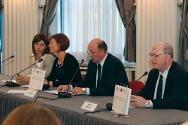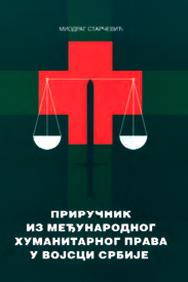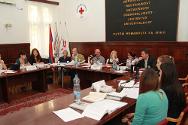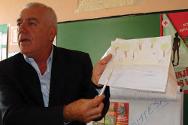Western Balkans: Newsletter
02-04-2013 Field Newsletter
Contents
Editorial

The conflicts ended years ago, but the memory of those still missing continues to haunt the Western Balkans.
Over a decade after the armed conflicts in the Western Balkans ended, the ICRC’s regional delegation in Belgrade continues to focus on an issue that is still causing grief to thousands across the region – the fact that they do not know what happened to relatives who went missing during conflicts in the former Yugoslavia. The ICRC is determined to do all it can to help families discover the truth.
The right to know the fate of a relative is anchored in international humanitarian law and human rights law. Parties to a conflict must take all feasible measures to account for persons reported missing.
Missing persons

A session of the ICRC-chaired “Working Group on persons who are unaccounted for in connection with the events in Kosovo from 1 January 1998 to 31 December 2000.”
© ICRC
Forced disappearances were one of the tragically prominent features of the wars waged in ex-Yugoslavia. Families have reported almost 35,000 persons missing to the ICRC.
Under international humanitarian law, it is the authorities who exercised control over the territory in which a person disappeared who must provide answers, and they are required to make every effort to do so.
The ICRC has been working with the authorities in the Western Balkans, helping the families of missing persons in their quest for answers as to the fate of their missing relatives.
One aspect of this work is the ICRC’s role as chair of the “Working Group on persons who are unaccounted for in connection with the events in Kosovo from 1 January 1998 to 31 December 2000.” This Working Group, established in 2004, is a humanitarian forum in which the representatives of the Belgrade and Pristina authorities exchange information and plan activities aimed at clarifying the fate and whereabouts of missing persons. Since it was set up, the Working Group has had over 30 sessions. Over 1,700 cases have been resolved, mostly through exhumation and identification.
The immediate plans laid out by the Belgrade and Pristina delegations to the Working Group specify the field work and exhumations to be conducted at locations which are suspected to be gravesites, such as Kosare or Raska (Rudnica). It is a matter of concern, however, that information that could lead to yet undisclosed burial sites is not being provided to the extent that one would expect. The ICRC urges the authorities to provide this information without delay.
The ICRC is maintaining a dialogue with the authorities in Zagreb and Belgrade regarding people who went missing during the 1991-1995 conflict in Croatia. We are asking them to do all they can to accelerate exhumations at the known gravesites, and to intensify the search through their archives for the locations of any unknown burial sites, as over 2,300 persons are still missing.

Zagreb, Croatia. 18 July 2012.
Presentation of the third edition of the “Book of Missing Persons on the Territory of the Republic of Croatia.”
© ICRC
As of the end of 2012, the fate of some 12,500 persons throughout the Western Balkans remains unknown. Sadly, some of these people will never be accounted for, but there are two major areas in which the organizations involved in the search for missing persons should invest additional effort, so as to solve as many as “missing persons” cases as possible:
Information about new potential gravesites
Potential gravesites
It is assumed that there are as yet uninvestigated gravesites. But information about them is scarce, and this is the most serious obstacle to tracing missing persons. To locate this information, and bring solace to the many families still waiting for answers, the authorities need to search their files and archives.
Exhuming and identifying remains
The process of exhuming and identifying remains is distressingly slow for the families of missing persons. Their lives are torn apart by the anguish of not knowing what has happened and the process must be accelerated, for their sake and for the sake of the societies to which they belong.
For various reasons, it has so far proved impossible to identify many sets of human remains that have been exhumed across the region. Identifying them might reveal what happened to about a third of those people still registered as missing. Meeting this complex forensic challenge requires increased interaction between forensic practitioners, national bodies and the families concerned.
Compliance with international humanitarian law
People – especially soldiers – are more likely to obey international humanitarian law (IHL) during armed conflict if they know its rules, if countries apply the rules and if they punish individuals who do not.
In the four countries it covers (Albania, Macedonia, Montenegro and Serbia), the Belgrade delegation works with the armed forces on integrating the law of armed conflict in their education and training. This has resulted in the production of manuals and in improved IHL training.
The ICRC has also cooperated with national parliaments, ministries and inter-ministerial IHL committees on the incorporation of IHL in national legislation. In June 2012, the ICRC’s Belgrade delegation and the IHL Committee of the Serbian government co-organized a meeting on IHL implementation for IHL committees from Central and South-East Europe.
However, the ICRC has focused its greatest efforts on IHL education for young people. We have helped academic institutions to develop the teaching of IHL. These institutions are now offering IHL courses and taking part in national and international student competitions. One institution, the Faculty of Political Science in Belgrade, has established a Centre for IHL and International Organizations, which has been lending its expertise beyond the academic context.
The most far-reaching educational programme has been Exploring Humanitarian Law (EHL), an education programme for schoolchildren.
Created by the ICRC and adapted by national pedagogical specialists, EHL is taught regularly to pupils aged 13 to 18 throughout the Western Balkans, ensuring that the youngest generation learns the rules and principles of humanitarian law and action.
The ministries of education and the Red Cross Societies of Albania, Macedonia, Montenegro and Serbia have been implementing EHL. They see the programme’s interactive modules as a natural way of encouraging young people to become concerned citizens and to contribute to humanitarian activities in their communities.
Cooperation with the Red Cross Societies
The ICRC regional delegation in Belgrade works in cooperation with its national partners, the national Red Cross Societies.
The Red Cross Societies of the four countries cooperate with the ICRC on a range of programmes, from supporting the families of missing persons to IHL and mine-risk education. They have established themselves as credible and competent partners to national authorities and international organizations and are progressively taking over full responsibility for many programmes that were originally initiated and implemented with the ICRC.


